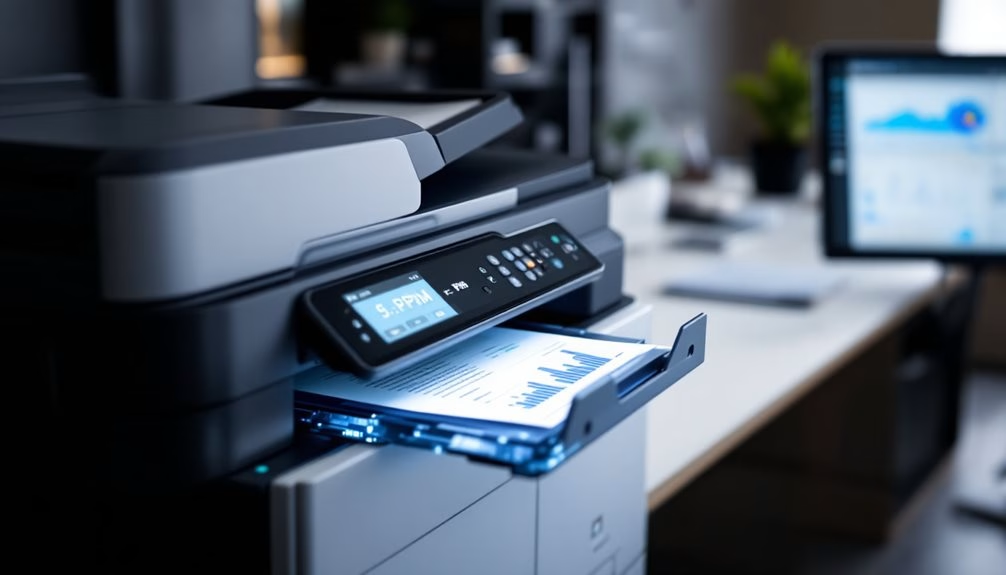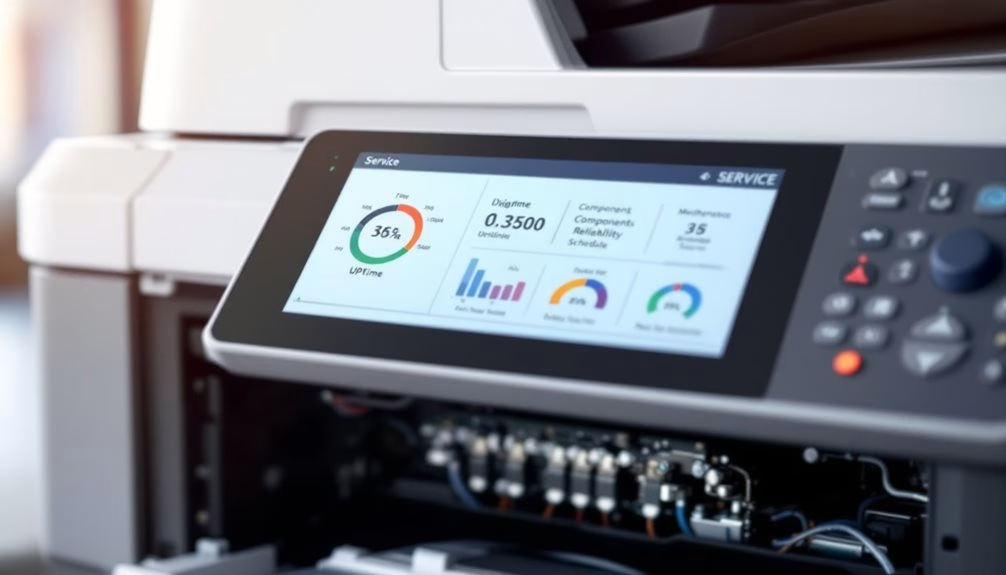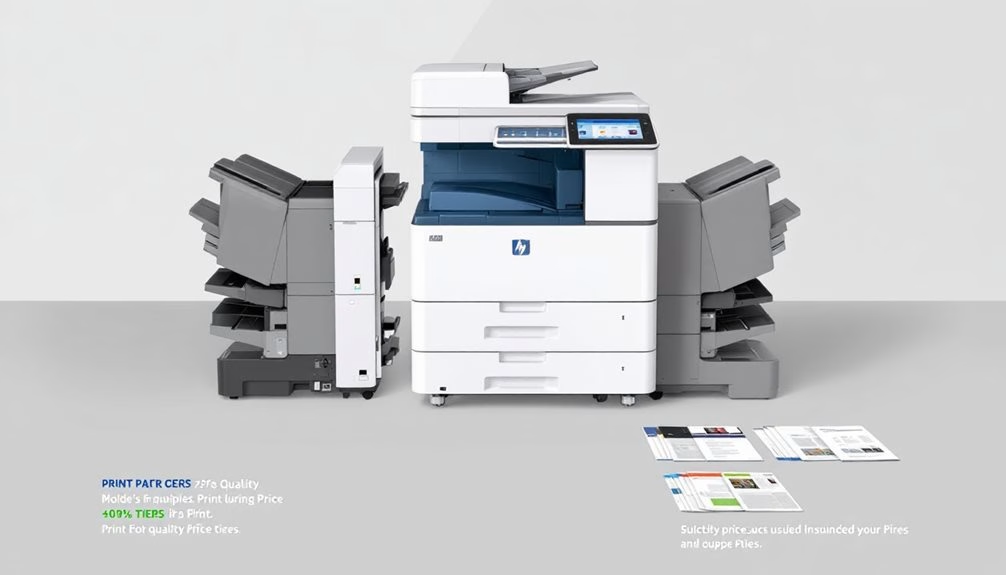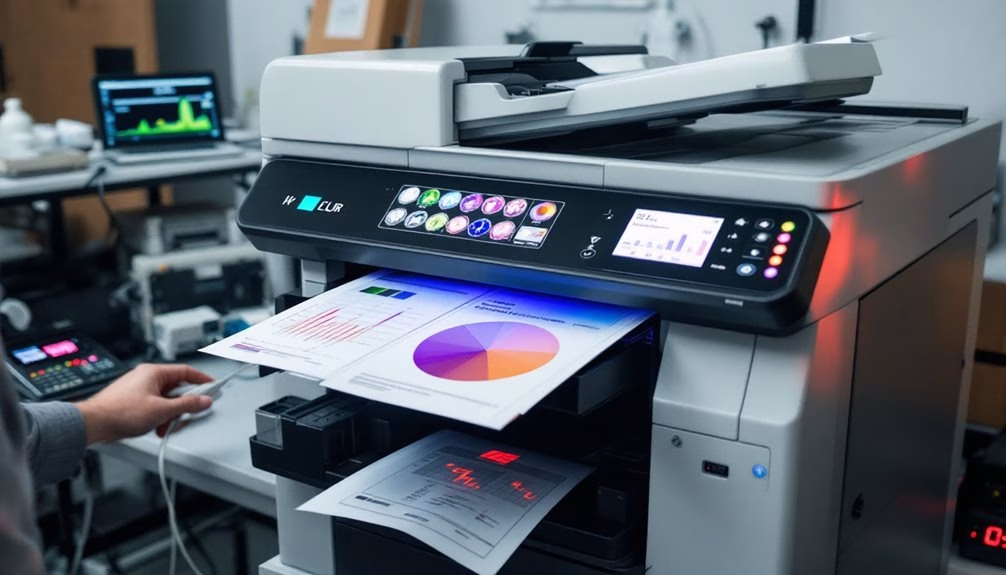When evaluating copier brands for performance, we recommend focusing on five key metrics: speed (PPM), reliability statistics (MTBF), print quality resolution, feature functionality for your price point, and real-world user satisfaction ratings. Don’t just trust peak performance numbers—consider your actual usage patterns. Canon and Xerox typically achieve 99.5% uptime, while budget options hover around 97%. The right analysis will reveal which brands truly deliver value beyond their spec sheets.
Expert Highlights
- Compare reliability metrics like MTBF and uptime percentages, with top brands like Canon and Xerox achieving 99.5% uptime.
- Assess print quality by examining resolution specifications, with Canon offering superior color accuracy at 1200×1200 dpi.
- Evaluate speed and throughput via PPM ratings, first-page-out time, and actual usage patterns rather than peak performance.
- Consider real-world testing through volume testing, continuous operation monitoring, and user satisfaction ratings.
- Match feature functionality to your budget, with significant improvements often found in mid-range models ($3,000-$7,000).
Speed and Throughput Metrics That Matter

When evaluating copier performance, how quickly should we measure success?
We’ll need to focus on metrics that truly impact our daily workflow.
Pages per minute (PPM) is our baseline measurement, but let’s look deeper. First-page-out time matters when we’re printing single documents.
Monthly duty cycle tells us durability for our team’s demands.
Don’t forget scan speeds and processor capabilities – they determine how quickly we’ll move through multi-step jobs.
The fastest machine isn’t always the right choice for our needs.
Let’s consider our actual usage patterns rather than chasing impressive numbers that won’t translate to real-world productivity gains.
For optimal operation, consider devices from premium brands offered like Canon, HP, Xerox, and Ricoh that provide the best balance of speed and reliability.
Reliability and Downtime Statistics

Although speed metrics provide valuable insight, reliability ultimately determines a copier’s true value to our organization.
We need to examine Mean Time Between Failures (MTBF) and average repair resolution times across brands.
Industry leaders like Canon and Xerox typically achieve 99.5% uptime, while budget options hover around 97%. That 2.5% difference translates to hours of lost productivity each month.
We should also consider each manufacturer’s service level agreements. The best vendors guarantee response times under four hours and provide extensive preventive maintenance programs that catch issues before they disrupt our workflow.
Working with suppliers who offer factory-trained technicians ensures that maintenance is performed correctly with genuine OEM components, further reducing unexpected downtime.
Print Quality and Resolution Comparison

Print quality and resolution represent the visual output standards that directly impact how our documents and marketing materials appear to clients.
When we’re comparing brands, we need to examine these elements carefully to guarantee we’re getting the best reproduction for our investment.
- Canon models typically offer superior color accuracy at 1200×1200 dpi
- Xerox leads with precise text rendering and consistent blacks
- HP’s ColorSphere technology provides exceptional vibrancy
- Konica Minolta excels in fine line reproduction and halftone quality
- Sharp differentiates with their micro-fine toner particles for smoother gradients
We’ve found these quality variations can considerably affect how our team’s work is perceived.
Implementing Managed Print Services can enhance your print quality while reducing overall printing expenses by up to 30% through optimized device selection and maintenance.
Feature Functionality Across Price Points

As businesses evaluate copier options, understanding how features scale with price becomes essential to maximizing our return on investment.
Entry-level models ($1,000-$3,000) offer basic copying, scanning, and printing capabilities with moderate speeds of 20-30 ppm.
Mid-range units ($3,000-$7,000) add advanced paper handling, higher volume capabilities, and enhanced security features.
Premium copiers ($7,000+) deliver enterprise-grade functionality including sophisticated finishing options, cloud integration, and advanced workflow automation.
We’ve found the sweet spot often lies in mid-range models where we gain substantial functionality improvements without the premium price tag.
When selecting, we’re all looking for the right balance of features that truly serve our daily needs.
Opting for multi-function printers with high-yield toner options can reduce your total cost of ownership by up to 30% while maintaining quality output.
Real-World Testing Methods for Copier Performance

To thoroughly assess copier performance, we’ll examine two critical testing methodologies.
Our volume testing evaluates how machines handle high-capacity jobs, continuous operation, and stapling capabilities under real workplace demands.
We also conduct extensive print quality assessments measuring resolution, color accuracy, and text clarity across various paper types and environmental conditions.
Different copier model types should be evaluated based on your specific usage environment, whether for commercial business settings or home-based operations.
Volume Testing Methods
Volume testing represents the most reliable method for evaluating a copier’s real-world performance capabilities. When we conduct volume tests, we’re simulating the actual demands your office will place on a machine.
This helps us identify which brands maintain consistent quality under stress.
- Run continuous high-volume jobs (1000+ pages)
- Test mixed media types in single jobs
- Measure speed degradation over extended runs
- Monitor heat buildup and component stability
- Track consumable usage rates during heavy loads
We’ve found that many copiers perform well in short bursts but falter during sustained use.
That’s why we prioritize volume testing—it reveals which machines will truly meet your team’s daily demands.
Print Quality Assessment
Print quality remains the ultimate measure of a copier’s value, regardless of its volume capabilities. We assess this through both technical and practical means.
First, we examine resolution using industry-standard test patterns that reveal line clarity and detail reproduction. We then evaluate color accuracy with gamut charts and real-world photos, noting how well flesh tones and brand colors reproduce.
Text legibility testing is essential – we print various font sizes to guarantee readability at 6pt and below.
Finally, don’t overlook consistency; we print multiple copies to detect any degradation across runs.
User Satisfaction Ratings and Long-Term Performance Data
While technical specifications provide valuable insights, user satisfaction ratings and long-term performance data offer a more thorough picture of copier reliability.
Looking beyond specs to real-world satisfaction data reveals the true story of which copiers deliver reliability when it matters.
We’ve found that consulting multiple sources reveals patterns that can guide your decision and help you join the ranks of satisfied business owners.
- Industry reports from J.D. Power and BLI provide unbiased performance rankings
- Online customer reviews highlighting real-world experiences across various environments
- Service records showing frequency of repairs over 3-5 year periods
- Downtime statistics comparing brands under similar usage conditions
- Consumer Reports reliability scores comparing brands across price points
Frequently Asked Questions
How Do Copier Brands Compare in Energy Efficiency and Environmental Impact?
We’ve found that Xerox, HP and Canon lead in energy efficiency with Energy Star ratings, while Ricoh and Konica Minolta excel at environmental programs and recycled components.
What Security Features Protect Sensitive Documents Across Different Copier Brands?
We’ve found most leading copier brands offer user authentication, data encryption, secure printing, and automatic hard drive wiping. Canon and Xerox typically provide the most robust document protection features for our sensitive materials.
How Do Mobile Printing Capabilities Vary Between Major Copier Manufacturers?
We’ve found most major brands offer mobile printing, but Canon and Xerox lead with robust app features, while HP excels in cloud integration. Ricoh and Konica Minolta prioritize enterprise-level security controls.
Which Brands Offer the Best Customer Support and Service Plans?
We’ve found Xerox, Canon, and Ricoh consistently offer high-quality customer support and service plans. They’ll keep you connected with 24/7 assistance, quick response times, and thorough maintenance packages.
How Easily Can Different Copier Brands Integrate With Cloud Storage?
We’ve found Xerox, Canon and Ricoh offer the smoothest cloud integration. Konica Minolta and HP aren’t far behind. They’ll connect you effortlessly to Google Drive, Dropbox and OneDrive solutions you’re already using.
Expert Final Thoughts
We’ve explored how to evaluate copiers based on real metrics rather than marketing claims. When you’re making your decision, don’t forget to weigh speed, reliability, print quality, and features against your specific needs. By conducting hands-on tests and reviewing satisfaction data, you’ll find a copier that delivers consistent performance long after installation. Remember, the best machine isn’t always the most expensive one—it’s the one that works for you.
About the Expert
Rafael M.
CEO of JR Copier
With over 35 years of hands-on experience in the copier and office printer industry, Rafael brings unparalleled expertise to every client interaction. His journey from service technician to CEO provides him with comprehensive understanding of all aspects of the business.
Areas of Expertise: Copier and printer sales, equipment leasing strategies, maintenance solutions, and managed print services. Rafael's deep industry knowledge ensures clients receive expert guidance, transparent pricing, and exceptional service for all their office equipment needs.
Connect on LinkedIn